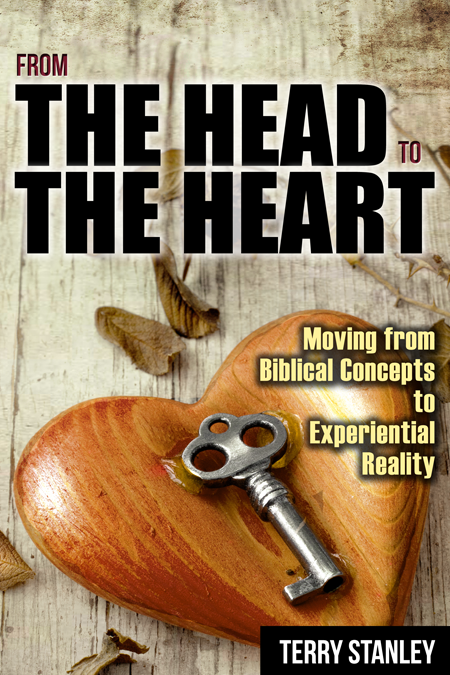Although we are born with a selfish and sinful nature, as very young children we are an open book in many ways. We come into the world ready to believe. Our hearts are wide open and trusting. As very young children we are hungry to learn and eager to interact. Like a blank page, we are asking to be written upon. Because of this openness and our unguarded hearts at this very early stage in life, at a rapid rate we take in what our parents teach us and we learn to trust the new world around us.
We also learn something else early in life. We learn that life is full of difficulties. There is trouble lurking around every corner. People will lie to you, yell at you, and people will leave and abandon you.
Take for instance five year old little Laura. She is open and tender. She is hyper-sensitive. She is unguarded and completely unprotected. Little Laura has a soft heart and she is looking to her Mother while totally trusting her. But something happens.
One day, the hatchet comes. Mom is having a real bad day. So she screams at Laura, “I AM SO SICK OF YOU! GET AWAY FROM ME!”
And then you have little Josh who is playing outside with the neighborhood kids. He loves his little friends, and more than anything Josh wants his friends to love him back. But one day his friends yell at him, “You STUPID little jerk! You’re a stupid little idiot!”
As children growing up, we learn to handle life’s situations. We figure out very early that in order to survive, we must learn to cope. There is no way we can remain so tender and soft hearted and take the knife at the same time. We feel as though we would be destroyed. So what do we do?
We learn to self-protect. We learn to build a wall of safety around our hearts. This wall of safety feels like it will protect us. Hardness of heart develops. Therefore, we are not quite as tender at eight years old as we were when we were three years old. We are not as tender at eighteen as we were at eight.
The fortresses and the walls of safety we build around our hearts are designed to buffer the negative opposition that comes our way. We can classify these negative forces that come our way into two very basic categories: Abuse and abandonment. Everything can fit into one of these two categories. When someone attacks us either verbally, physically, or emotionally, we feel abused. If someone we love or depend on ignores us, does not actively love us, or leaves us altogether, we have been abandoned. Both abuse and abandonment are damaging and too much to bear. We learn to guard and protect our hearts from this happening.
It is also important to understand the nature of our defenses. Just like there are two categories of affront, our fortresses of self-protection also take on two basic defense strategies against the abuse and abandonment: We can either fight or we can take flight. Let’s look at a couple basic examples.
Our basic human needs are safety and love. We cannot take in love or receive love until safety is achieved first. Our needs for safety are great. If we do not feel safe (on many different levels) we react strongly. We do not feel safe if we are being abused (abuse can come in many different forms). In the same way, if we are abandoned and left alone we will not feel safe.
We become hyper-vigilant to scan for these various abuses and abandonments that might be coming our way. One of our flesh’s missions is to anticipate seeing abuse or abandonment ahead of time, before it reaches us, in order to head it off and keep it from happening. The flesh is preventative and extremely self protective by nature. Again, we typically have one of two preferred methods of self protection. We either fight or we take flight. The fighting variety of flesh attacks in order to defend itself. It can attack people if threatened or hurt by them or it can attack the situation at hand and “take the bull by the horns”. Sometimes the attacking or fighting back we do is very subtle. We may not physically punch someone in the nose, but we may jab them back with words or say a cutting remark. There are many varieties of fighting.
The flight variety of flesh tends to runs away or avoid. In order to take flight during difficulties, we ignore, pretend it isn’t there, or steer clear in some way. This is what is called a weak reaction, but it is still fleshly none the less.
The point is this: These various mechanisms of self protection within the heart cause us to not be in a trusting posture. The flesh is in a constant mission of taking care of itself instead of trusting in God. During the early years of life, we learn that ultimately no one else will take care of us, so we have to do it ourselves. This sets up in us a deeply ingrained expectation to think the Lord will not take care of us either.
The Imposter
Because our life long mission has been self protection and self preservation – our entire approach to life, people, daily tasks, and choices come out of this low level programming in each of us. Very easily we remember how it feels to be in the self protective posture that we’ve created (fight or flight or some combination given the circumstance). We have lived in this heart posture most of our lives and therefore we are very used to it.
Through the years and from a very early age, our particular fortress we have built becomes part of our identity. An identity is the way that we think of ourselves. It is sort of like a home base for a way of being. Our individual identity becomes a combination of beliefs, postures, and defenses all developed in order to handle life’s situations. Your identity is how you see yourself and how you feel inside. It is actually your belief of who you are.
Who We Were Then, Is Not Who We Are Now
When we come to Christ, He changes who we are. That is great news. But now we have a new problem. We remember who we were. We often believe that who we are now is who we were before we came to Christ. We remember the old identity and we easily slip into it. Our old identity has been burned deeply into our memory.
We remember that our old self needed protection from other people. Who we are now in Christ needs no protection. He is our protection and we are now free to be childlike. We remember that when we were who we used to be, we constantly guarded ourselves from an earthly father who both yelled at us and crushed us, or we had a father who neglected us and abandoned (or a combination). So our old self always had to be ready to be annihilated or we had to be ready to be left alone. But who we are now is a child with a perfect Father. He is completely loving and tender. He will never leave us alone for all eternity.
There is no more need to have an identity of one who fights or takes flight, because our Father is perfect. He fights for us. And, we are hidden in Him. There is no more need to have an identity that self-protects. If others hurt us, we are comforted and healed.
When we come to Christ, the Spirit is regenerated and made new, but the body is not regenerated yet. We will not receive new bodies until the resurrection. Our brains, which contain our memory, are part of the body that is unregenerate. In other words, when we come to Christ, we do not receive a new memory. We still have the old memories telling us what to believe and telling us who we are. This is why the scripture teaches us that our minds must be renewed. We must now learn who we are now in Christ.
A Path of Least Resistance
We must stop identifying with who we were and identify with who we currently are in Christ, but not just in concept. There is a great and scriptural way to help in the process of re-learning who we are. In the morning, when we first open our eyes from sleep, king self tries to gain control of the throne right away. The flesh begins to scan. It scans for potential dangers and for things that may threaten its safety. It immediately picks up the problems in life you went to bed with. Hurts we carried from the day before, various fears, relationship issues, anxieties and stresses hit us right away. First thing in the morning the flesh also goes on a hunt for fulfillment in some way. Usually during the first minutes of morning, we begin to scheme and plan our various escapes and lusts. We immediately revisit our heart postures from the day before. During this time, the flesh wants to re-fortify its castle and plan its method of either attack (fight) or its strategy of flight. We are tempted to put on the old identity. Please keep in mind that all this is usually done in a matter of seconds. It is usually very subtle and we are often totally unaware.
As the minutes of the morning pass by, the flesh continues to strengthen its foothold. The old identity is remembered and re-enforced as each minute ticks by. In the morning, immediately after you open your eyes, is the best time to begin the believing and trusting process. Why? Because the flesh is a little off base when we first wake up. It is trying to gather itself together to take its position on the throne. During the early minutes of morning it is not extremely dug in yet. As we engage our hearts with the Lord Jesus in the morning and begin believing the gospel before our feet hit the floor, it becomes a path of least resistance.
If you wait until mid-morning or the middle of the day to engage your heart and believe and trust, you will have more of a battle on your hands. It is not impossible by any means, just more difficult – possibly more time consuming to break through to the Spirit. The flesh is more solidified as we encounter the troubles that each day holds.
When we wait too long to believe the Lord each day, the old identity becomes a bigger problem. As the day rolls on and king self grips the throne, we remember very well who we were before we came to the Lord, and we live it out. We need to start early. Make it your practice to engage in believing the things that are already true in God, before you encounter trouble and before you begin to identify with the old you. As you become converted each morning into being a trusting little child, you will be renewing your mind to re-identify with who you are now in Christ.
I understand that many people have a bad taste in their mouths from being under the so called “quiet time” laws. We were taught that we have to have time with God every morning and read our Bibles in order to be acceptable. This is not true at all. We are approaching this from an entirely different angle. Spending time with the Lord in the morning is not a rule. We are still acceptable to God, even if we don’t. We can turn to the Lord at any point during the day. But doing it in the morning simply works the best.
Establishing a Baseline for the Day
You will find that as you have a good and thorough experience of the Lord in the morning hours, it will provide a baseline for the rest of the day. In other words, even if you get off some during the middle of the day, your heart will remember very quickly the place it found earlier that morning. Heart postures tend to have a strange sort of memory – or tendency to return to themselves (whether good or bad). Faith leads to more faith. And flesh leads to more flesh. As we live a life of trusting, we are apt to trust even more.



